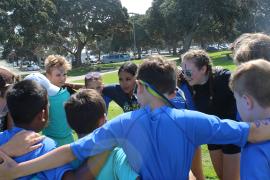Sending a child to camp, whether it's a day or resident camp, can be a scary proposition for parents. After all, they are entrusting us with their most precious possessions. They want assurance that we are as concerned for their children as they are themselves - that we will keep them safe under any circumstances. Communication is an invaluable tool to assure parents that their children are safe.
Remember the old saying, "First impressions count"? Communication starts with our first contact with parents. This could be by word of mouth, an inquiry phone call, brochure, advertising, or at an open house. If we establish right from the start that we want to be open and honest, we will build a foundation of trust that we can depend on if an emergency happens.
Communication Is a Two-Way Street
Of course, communication is a two-way street. It is just as important for parents to tell us about their children as it is for us to let them know what is going on at camp. A term that I have used for years is "partnering with parents." It emphasizes the shared responsibility of camp directors and parents to provide a successful summer for their children. In order to have a complete circle of communication, parents need to share the appropriate information about their children, and directors need to share that information with their staff. Camp directors should discuss this partnership with parents long before the summer begins, both verbally and through a parent handbook. With increased access to the Internet by parents, camp directors are also using e-mail and the Internet as a quick and easy way to transmit and receive information. Many camps now have Web sites with up-to-date information to accommodate busy parents.
This summer, considering the emotional trauma we have all gone through, it will be doubly important for parents to let us know how their children have reacted to the past few months so we can be more attentive to their needs. Bob Ditter, licensed child and family therapist, author, and camp consultant, reports that in the conversations he has had with camp parents since September 11, the most frequently asked questions are, "Are camps thinking about cutting down on mail?" and "What if something happens during camp?" Parents want and need to hear that camp directors are being proactive and have a specific plan to deal with unforeseen emergencies. Camp directors need to communicate with parents before camp starts and let them know what the emergency plan is.
Communicating in a Crisis
Communicating with parents can be difficult in the best of times, but during a crisis, it becomes simultaneously more important and more difficult. Communication is an art, and like most arts, it needs to be practiced. Our directors are in a unique position in that they all have executive directors to whom they can turn for assistance in assessing what needs to be said and who should make the phone call. We suggest that directors role-play situations before the start of camp so if they should be in a difficult situation, their response will be second nature. Camp directors must choose their words carefully and control the tone of their voices. Getting an unexpected phone call from a camp director is every parent's worst nightmare - at least for that split second until the parent hears the reason for the call.
A weather crisis
One of the Jewish Community Center (JCC) day camps experienced a frightening weather-related situation last summer. On the first day of their second session, a fierce thunderstorm moved through the area, and the entire JCC campus lost power. Since there were no phones, no electricity, no swimming pools, and it was forecasted to be over 100 degrees that day, the decision was made to cancel camp.
Unfortunately, some of the child-care children had already arrived. Staff with cell phones were immediately mobilized to call parents. They were asked to follow a prepared script to let parents know of the situation and assure them that their children would be well cared for until they could be picked up. In the meantime, the local TV and radio stations were contacted and told that the JCC was closed and day camp was cancelled. To show appreciation to parents for understanding the situation, everyone who was registered for camp that week received a coupon good toward any JCC program within the year, plus two guest passes per camper. Once more, quick and clear communication forestalled irritation and resentment.
A transportation crisis
Sometimes an emergency can arise while children are traveling back and forth to camp. After spending a marvelous day at a JCC day camp in the Midwest, all the children boarded busses to head home. As one of the busses came to a stop at a stop sign, the driver slumped over. As the bus began to roll backward, the bus monitor in the front seat jumped up and pulled the emergency brake. Quickly, the counselors in the back of the bus opened the emergency door, ushered all the campers off the bus, and assembled them on the lawn of someone's house to keep them safe, calm, and occupied.
One of the monitors, who was a medic, determined that the bus driver had had a heart attack. He administered CPR while other counselors radioed the bus company and the camp director. Another bus arrived shortly to pick up the children, and the camp director immediately put together a team of administrative staff to call the parents of every child on the bus to let them know what happened and reassure them their children were safe and would be home shortly. Calling parents to let them know about an incident before they hear it from their children allows them to process it before the kids get home. They are then better prepared to help their children deal with what happened.
Attack on a center
There are some crises at camp that we would not expect to happen in our wildest dreams. On August 10, 1999, on a beautiful sunny California day, while camp was in session, a madman with a gun burst into the lobby of the North Valley Jewish Community Center and started shooting. He fired up to seventy shots, wounding five children and adults, before deciding he had done enough damage and ran out.
In the report, "A Case Study in Crisis Management: Attack on a Jewish Community Center," published for members of the JCC Association, Jeff Rouss, executive vice president of the JCC at the time, stated, "General evacuation procedures called for exiting to safer environments. Although they were unsure what was considered safe from a gunman's automatic weapon, most counselors and teachers took their students and campers to safety. Using the camp's walkie-talkie system and following directions of police reached by a counselor's personal cell phone, counselors hastily loaded the camp busses and drove to a nearby park. Teachers and counselors also led their students and campers to a nearby church and convalescent hospital."
Once the JCC became a crime scene, staff could not access their records, and therefore, parents learned of the evacuation and reunification procedures through the media. "Within a half hour after the attack, we had secured top-level public relations assistance and recognized that the press had to be managed from the site of the attack," Rouss explains. "The media followed our protocols, which were designed to protect the privacy of the Jewish Community Center and its members. In order to keep the media satisfied, we held frequent briefings and introduced them to members and staff who we had determined could tell the story we wanted told."
After consulting with community mental health professionals and the police, it was decided that camp and school would reopen the next day in the nearby church. Dr. Robert Abramovitz, chief psychiatrist at Jewish Board of Family and Children's Services in New York City, believes that community support is a useful response to a traumatic event. "Taking part in organized community activities directed towards responding to the problematic situation . . . can be very valuable for older children and adolescents." There was a pre-Shabbat service of healing on the Friday after the attack, attended by 1,000 people on the grounds of the North Valley Jewish Community Center. On Sunday, the Jewish Federation of Greater Los Angeles coordinated a community rally of unity attended by over 2,000 people. The Jewish Community Center reopened at its own site on Monday, with no evidence of the assault visible in the building. In a paper on crisis management prepared for AM Skier Insurance, Gary Kimball, executive director, Camp Alert Network, says, "Be consistent by maintaining your daily schedule. Consistency equals safety in a child's mind."
Responding to Tragedy
The Jewish Community Centers Association has always recommended that camps have a crisis plan in place. This summer we are asking them to take that one step further. We are asking our directors along with our program staff to develop a plan to answer the question - What if September 11 happened on July 11 when JCC camps were in session? - and to communicate the plan to the parents. Norman Friedman of AM Skier Insurance suggests including the following statement in parent handbooks: "Until we can communicate, we will personally care for your child."
Even though parents want to hear only good things, they understand that things can happen. Our parents have faith in our camping programs. They believe in us. They trust us. The thing they want most is to be kept informed and for our camps to be honest with them right from the start. William Shakespeare wrote, "No legacy is as rich as honesty." What I recommend to all camp programs is to continue the legacy and tradition they have all worked so hard to develop and preserve.
Charlene Wendell is the consultant on camping services at the JCC Association. She has been a camping professional in both day and resident camp for over twenty years, serving in positions ranging from counselor to director. Wendell can be reached at 212-532-4958, ext. 271, or at [email protected].
Originally published in the 2002 March/April issue of Camping Magazine.




